- Home
- Tanpepper, Saul
Nocturne Page 2
Nocturne Read online
Page 2
How could he still be alive? He looked at the charred remains of his hands, at the dull white and gray bone underneath. Numbness. His hands found his cheeks and pulled the hardened flesh away in chunks. How could he still be alive?
They had had a son. They had given him a good, strong name. And the son had been as strong as his name.
Someone tapped his arm. He looked up, startled.
“Any recommendations before we wrap up for lunch?”
The Man shook his head.
“Good, then let’s break. Everyone, meet back here at one-thirty.”
He gathered his papers, his glasses and his pen, and trailed the others as they filed out of the room.
† † †
In the past, he’d occasionally patronize the café on the ground floor of his building. They made good sandwiches there; good cookies, too. On the way in some mornings, he’d buy a coffee from the cart as a special treat to himself, but he hadn’t in a while; the coffee in the break room upstairs had a permanent bitter taste to it, metallic and thin, as if something toxic had leached into the water from the pipes.
These days he rarely ate or drank anything at all, opting instead to spend his break time at the window in his office, hands clasped behind his back or in his pockets. He’d watch the people far below him, thrilling at the feeling of vertigo that would pierce his belly the first time he’d look down for the day, trying to trick himself into re-experiencing that feeling again but never quite succeeding; he could apparently only scare himself once a day. So he’d give up and just stand there, thinking of all the people on the sidewalks as tiny ants, how easily they could be wiped into oblivion. He knew it was cliché to have such thoughts, especially when he remembered how resilient people could sometimes be. Then, as always, his thoughts would inevitably lead to his son.
But not today. Today, he would be one of those ants. Let the giants far above him crush him.
He passed through the glassed front doors and out from the stunted shadow of the building. Looking up, he thought he saw sheets of paper floating down toward him, dozens of white sheets, but the shapes whirling above him caught the updrafts and did not fall. He stood and watched them for a moment as the crowd swirled past him on the sidewalk. Then, as if aware of his notice, the gulls wheeled around the corner and out of sight, leaving only the hard, grid-like shapes of shiny silver and black rising into an infinity of blue and the blazing white spot of the sun reflecting off the adjacent building, so bright in the center that it looked like a black hole.
He didn’t have a plan for where to go. He turned right, though he could have as easily turned left, but since the flow of the traffic was mostly right that’s the way he went.
Where were all these people going? Where did they come from? What were they hiding?
He stuffed his hands in his pockets and wondered these things as he walked. And it was only after ten minutes had passed and he had waited to cross at several stop lights before he realized he was heading downhill. He had become like water, finding the path of least resistance. But where would he settle? The buildings were getting older and smaller and the alleyways narrower. There were fewer people out walking, and those he did see weren’t dressed in suits of black or gray as were those around his uptown office, but jeans and sweat shirts and puffy winter coats, more often stained or torn or poorly sized than otherwise.
His nose led him to a small diner scratched out of the side of a parking garage, its windows decorated with a winter scene, the spray-on snow so obviously years-old by the messages people had inscribed in it during lunches and dinners past. The air smelled of fried pork and hot chocolate and, for a moment, he thought of going in.
He looked in through the glass, at the cheerful red and white checkered tablecloths and the mismatched cheap metal and plastic chairs, and his stomach growled. But then he realized that he was being stared back at by a man with a black mustache and a dark look in his eyes. The Man stumbled away from the window, knocking a woman who was walking past so that she almost dropped the plastic bag in her arms. It was laden with groceries. He heard the clack of glass bottles come from inside of it. She grunted, stumbled, gave him a nasty sideways glance, then hurried on.
Minutes later, he found himself at the river’s edge. Silty water swirled past him, fifteen feet below the vertical face of the unprotected concrete bank. A car passed on the bridge twenty feet overhead, a hush of tires on stone followed by a rapid click-clack as it reached the metal junction of bridge and road. A wind blew stale and cold off the water; the place had a desolate, abandoned feel to it.
No, that wasn’t right. It didn’t feel empty, it felt…devoid of life. Devoid of life and yet not empty. He didn’t feel alone.
The tattered remains of old pigeon nests fluttered from the girders of the overpass, painted white by uncounted years’ worth of shit. But the nests were currently empty. The shadows beneath the bridge seemed to shrink and harden, becoming cold and secretive then graying as clouds cleared the sun. He thought of them as doorways. But for what kind of nightmare creatures?
On the water, a dead animal floated past. Possum. How did the thing die?
He heard a siren somewhere, and it grew louder. Soon, it passed overhead, and the red of its lights flashed in the windows of the warehouse on the opposite bank. Then it passed and faded into the distance.
That’s when he heard the laughter. It was soft and low at first, as if the breeze itself were chuckling, or the bridge was sighing. It was joined by another, this one louder and echoing off the cement wall opposite from where he stood. He still couldn’t see anyone, but he knew he was surrounded.
“Are you lost, old man?” the shadows teased. The words were a slap to his pride, but not because he was lost—he knew where he was, roughly, and how to get back—but because he didn’t think of himself as old. The voice had sounded playful, spirited.
A second voice called out to him, female this time, sounding sultry and distinctly more threatening: “Hello there, lover boy.”
“Who’s there?”
There was a round of barking laughter coming from no one place, a half dozen distinct mouths blending into one, sounding like a hundred braying dogs. The palms of his hands tingled; his scalp tingled. He turned to leave, found his way blocked.
The boy couldn’t have been older than fifteen. He was swinging a chain, and the Man could see attached to the end of it a tangle of sharp metal scraps. It looked like spiders at first, a giant cluster of newly hatched spiders. But then he saw that it was forks and steak knives and baling wire and random metal fragments, all twisted through the links of the chain, crumpled into a ball of torture. It was not meant to kill, but to maim.
“Going somewhere?” the boy crooned.
The Man turned around and there was the girl. He was struck for a moment by her appearance. Even beneath the makeup of dark circles around her bloodshot eyes and ratty hair and pale skin, he thought she might have once been pretty. The dirty white tee shirt she wore strained against her fulsome breasts, and there were holes in it through which he could see the telltale runes of ancient battles written on her skin. The nails on her hands were broken and had recently bled; there was no bleeding at the moment. Like the boy, the rest of her costume was an industrial mixture of black and metal, but her hands were empty. So were her eyes.
There was nowhere for him to run. There was only the river.
“Go ahead,” the boy said, as if reading the Man’s mind.
From cracks and holes in the walls, more of them emerged, six, maybe eight more, a jumble of young boys and girls made genderless by their uniform depravity. They looked virile and deadly.
“What do you want?”
The boy’s lips separated into a smile that showed amusement but held no humor. The chain in his hands rattled and clanked. The Man could hear the others approaching, eerily quiet, trapping him in the space beneath the overpass, blocking all but the one route of escape, as if testing him.
He stood his
ground. Death, he thought. Is this how you show your hand?
They came then, quickly and without remorse, falling upon him like starved beasts, biting and slashing at his face, tearing the clothes from him. He felt the flesh on his arms tear away, felt the boy’s mace rake his back. He did not scream, and neither did his attackers. They brutalized him without a sound, just the grunts of their blows and the low hiss of their ecstatic breathing.
Then they were gone. He was left standing, broken and bleeding, pieces of him lying all about his feet, shameful that he had been unable to defend himself, too old and too frail. He felt himself begin to fall, out over the precipice of that concrete river bank, the water rushing up at him. Then he was jerked back by the collar of his jacket.
“Hey, man! You okay?”
He gave his head a quick shake, turned it toward his rescuer. He blinked in surprise.
“One too many lunchtime martinis, eh?” the boy said, chuckling.
“I’m not…” The Man cleared his throat. “I’m sorry. I was… Thanks. I guess I wasn’t paying attention to where I was going.”
The boy nodded. He was dressed in black slacks and a tan leather jacket. He wore an earpiece that blinked a bright blue dot every few seconds. “Lucky I happened to be walking by just now, or you’d have had a nasty swim. The closest place to climb out of the river’s not for a few hundred yards upstream.”
The Man gave the boy a wan smile and shrugged. “Thanks again.”
“Better watch yourself around here,” the boy called after him. He gestured at the river and the Man nodded as if he understood. “Not the safest place to be taking a stroll, if you know what I mean.”
He did.
He thought the boy might finish by calling him “old man,” but he didn’t, and he felt an urge to ask him for his name. But, again, he didn’t. What difference would it make?
The rest of the day in the office passed uneventfully. The meetings ended around two-thirty and he spent the balance of the afternoon at his computer trying to catch up. He managed to get himself into a rhythm, approving or denying claims with an almost mechanical fervor, barely glancing at the forms and the names, which meant nothing to him, emptying his mind of stray thoughts, welcoming the blankness of the job and the numbness it provided. Approve one, deny three; approve one, deny four. Deny, deny, deny.
At five o’clock, the timer on his watch beeped. He finished with the last claim and shut down his computer, waiting until the quiet whir of the hard drive stopped and the orange light blinked for the last time.
Outside, the shadows were long on the land; the sun—he could just see it since his window faced south—was low on the horizon. Taillights and headlights, blinking red and white, threaded their way over the distant highway overpass; beneath them, the bright white dot of a train’s engine pulling into the freight yard. He watched the scene for a while before remembering that he was supposed to stop and pick up a steak for dinner, and he sighed as he pulled his jacket from the back of his chair.
The halls were already quiet, the lights in many of the offices dimmed and the doors closed and locked. Somewhere he could hear the furious clack of fingers on a keyboard; a water jug gurgled. Lonely sounds.
He made his way to the elevator, waited for the doors to open, pushed the button for the basement. As he waited to descend, the elevator lurched. He imagined it falling, dropping him to his death. The car slid to a gentle stop, released him into the parking garage. As he crossed the empty space, he listened to the clack of his shoes on the pavement, the soft echoes and chirps and car doors closing in places out of his line of sight. He listened for sounds that did not belong, and his eyes scanned the shadows and columns where an attacker could be hiding. But he was soon at the side of his car, then safely deposited inside it (after checking first). Now he was making his way to the exit of the parking garage. Now through the gate and out onto the darkening streets.
The market where his wife did their grocery shopping was on the main road in Stepford, the next town over from where they lived. He took the exit before his usual one and made his way there. The street was packed with rush hour traffic, and it seemed as if every light was against him. It was after six-thirty by the time he pulled into the parking lot, and the first nimbuses of evening fog were beginning to appear beneath the streetlamps.
The market was small, brightly lit, stocked mostly with local produce and patronized mostly by young people whose jobs required multiple cell phones and frequent travel to eastern lands; the meat department was off to one side. He waited in line to be served, standing behind an obese woman with thinning blond hair and a grumpy Pomeranian in her arms. Despite the chill in the air, she was wearing only a thin dress, and her bra strap showed. It was paisley, he saw. He stared at the folds on the back of her neck, waiting as she ordered a variety of cured meats, asking for extra thick slices. Jingly music played over the ceiling speaker.
“Two steaks,” he told the butcher when his number was called. He gestured to the display.
“Sirloin or t-bone?”
He frowned, uncertain. “Sirloin, I guess.”
The Man watched as the butcher lifted a pair of the steaks from the tray and placed them on a sheet of waxed paper on the scale. The slabs draped over the side and the top one slipped off and onto the stainless steel countertop. The butcher moved it back. The Man could see traces of dried and congealed blood where the steak had dropped, deep red. So very red.
The tang of old meat and decay came to him, warm and sweet. He hadn’t noticed it before.
“That all?”
He took the wrapped steaks, shaking his head. “Thanks.” On his way to the cashier, he added a bottle of lighter fluid to his basket and some matches. He read the warnings on the packages while he waited to pay for his purchases.
When he walked in the front door of their house, his wife greeted him with a smile. She took his briefcase and the steaks and disappeared into the kitchen with them. He wandered up to their bedroom, avoiding looking at the closed door of the room that they had decorated with so much happiness and anticipation years before. He thought he heard a noise coming from inside it, but he kept his eyes forward, even though he was unable to think about anything other than the son they had had and how they had given him a good, strong name. About how strong the son had been.
It was they who were weak.
He changed slowly out of his work clothes, carefully unknotting the gray tie and folding it and laying it tidily next to the others in the top drawer of his dresser. Next, he pulled off his dress shirt and white tee shirt. He sat on the bed and untied the stiff waxy laces of his shoes. He placed them on the floor in the closet. Off came the black socks, then the trousers.
Now he could smell the meat on the grill, and he called down to the Woman to cook his rare.
“You sure, honey? You usually like it medium well.”
He told her he wanted it bloody tonight, knowing that she would oblige him by cooking both steaks the same way. In the past, he had worried about contracting mad cow disease—what was it called? Creutzfeldt-Jakob disease, his mind whispered—but the threat seemed too distant anymore, too unlikely. It was a slow disease, not quick to the kill. They would go mad long before dying of it.
He wandered into the bathroom to drop the dirty clothes into the hamper, and the faint smell of chlorine drifted out if its depths, and he grunted. The man standing at the mirror looking at him was sorely middle aged, paunchy. His chest had a saggy look to it; the breasts were softened like cheese, and each came to a sharp point terminating with his pale and strangely pinched-looking nipples. The forest of hair had recently begun to sprout strange, kinky albinos, which he had harvested at first before giving up. He watched as the man in the mirror pulled on a Valley Tech sweatshirt that was a good fifteen years old by now. It smelled of him and a little bit of her. The man’s legs were white and thin.
He watched as the man in the mirror pulled off his underpants. He watched as he grew erect. The Man
knew the Woman would expect him to make love to her tonight—she always did—and his erection nodded accusingly at him. It listed off to one side, as if it were some kind of divining rod pointing the way to Salvation. He watched as the man took hold of himself. He watched the man begin to weep.
There was no looking the Woman in the eye at dinner. She sat across from him and the empty highchair was there to one side. She had pulled it from the corner and it seemed to loom over them as they ate.
He wasn’t hungry. He watched as she cut into her steak, her arm sawing with relish, her jaw working the meat. He watched as the blood leaked from inside the slab and spilled onto her plate, warm and red and soaking into the potatoes, staining the pile of saltine crackers she seemed unable to enjoy a meal without. He watched her finish her supper with a glass of red wine.
Hours later, he watched as she winced with the first signs of discomfort, cramps turning to distress, pain becoming agony. She clutched her stomach, stumbling to the bathroom where she vomited into the toilet for a full half hour before calling to him. He stood in the doorway and watched.
The next two hours she spent sitting on the toilet, alternately groaning and crying out. Finally, exuding a sickly sweet aroma and bleeding from every orifice, she crumbled to the floor.
The illness emptied her out. The deadly bacteria had prepared its new home. She hung on for weeks; she wouldn’t die.
“Dinner,” she called from the bedroom door, startling him. He realized he’d left the bathroom door open. Had she seen the man in the mirror?
He sighed, looked down at the limp flesh in his hand. It was just as well. His shoulder was sore. He pulled up his underwear, pulled on a pair of sweatpants from the dresser, headed down to eat.
She asked him about his day. He provided a cautious answer, carefully gauging her response, her body language. There was no sign from her what she was thinking or feeling. She placed his dinner on the table; when he saw the blood pooling beneath the steak his throat constricted and he nearly gagged, but he said nothing. The highchair had been pulled back into the corner. He couldn’t stop looking at it.

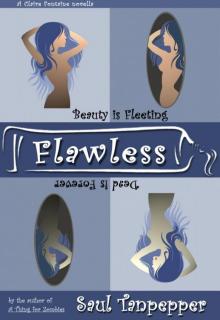 Flawless, a Claire Fontaine novella
Flawless, a Claire Fontaine novella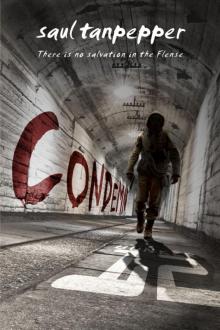 Condemn (BUNKER 12 Book 2)
Condemn (BUNKER 12 Book 2)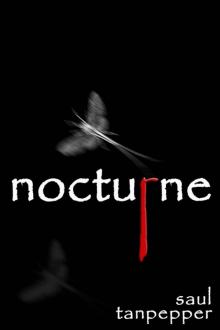 Nocturne
Nocturne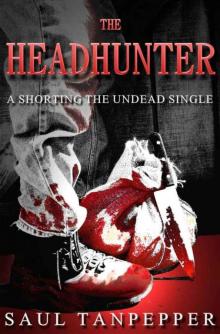 The Headhunter (Shorting the Undead & Other Horrors)
The Headhunter (Shorting the Undead & Other Horrors)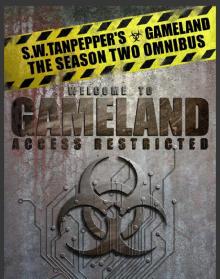 S.W. Tanpepper's GAMELAND: Season Two Omnibus (Episodes 9-11)
S.W. Tanpepper's GAMELAND: Season Two Omnibus (Episodes 9-11)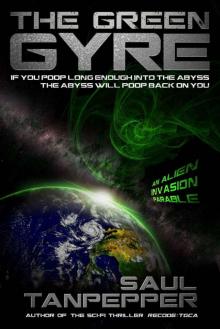 The Green Gyre
The Green Gyre